Hawaii is taking big steps to expand its tourism offerings by focusing on the rapidly growing sports tourism market. That industry generated an impressive $119 billion in 2023. Diversifying beyond beaches and traditional leisure travel markets, both domestic and international, this shift could help reshape Hawaii’s visitor profile and, if successful, provide new financial opportunities.
Governor Josh Green is in Nevada this week attending a related conference, signaling the state’s intent to learn from destinations that have capitalized on major sporting events. Nevada’s booming sports tourism sector, especially in Las Vegas—Hawaii’s unofficial “ninth island”—has become a top destination for large-scale events. Hawaii is looking to learn from that success.
Hawaii looks to sports events for growth.
Governor Green’s trip to Nevada coincides with Hawaii’s broader ambitions to court new travel markets, including sports tourism. With the U.S. preparing to host significant global events, including the 2026 FIFA World Cup and the 2028 Summer Olympics in Los Angeles, Hawaii wants to position itself to seize the momentum. The goal is to leverage Hawaii’s iconic appeal, natural beauty, and mild climate for year-round events ranging from triathlons and marathons to emerging opportunities like e-sports and beach volleyball championships.
Readers of Beat of Hawaii have voiced concerns about Hawaii’s current tourism strategy, particularly its heavy focus on Japanese visitors. As one reader, KA, pointed out, “Maybe because domestic tourism has been dominating the total visitor count in recent years without any help, while the share of Japanese tourism has declined.” With sports tourism, Hawaii may have a chance to re-engage not just international markets but also its often-overlooked U.S. visitors.
Lessons from Nevada’s sports tourism success.
Nevada has a proven track record of using sports tourism to revitalize a destination. Las Vegas, once known primarily for casinos, has transformed into a global sports hub, hosting events like the Super Bowl and Formula 1 racing.
Governor Green’s meetings with stakeholders in Nevada focused on understanding the investments and strategies needed to attract major sporting events to Hawaii. Hawaii wants to learn from Nevada’s success in hosting large-scale events to drive visitor numbers and boost local business revenue.
This shift is another new strategy for Hawaii, especially as tourism from traditional markets faces challenges. However, not all readers are convinced that the focus is right. Ernie S. commented, “The wealthy, rich, and powerful are the only target demographic that HTA is interested in. Greed is, as always, showing its face across all of Hawaii.” His concern reflects the apprehension that sports tourism might cater to a specific crowd, leaving out average travelers.
U.S. travel industry eyes major sporting events.
Governor Green’s Nevada visit occurred during the Meetings Mean Business Coalition’s gathering in Las Vegas, where key U.S. travel leaders discussed the importance of travel to the U.S. economy. The discussion focused on how major sporting events can boost tourism, create jobs, and support businesses. Travel in Hawaii and through the U.S. is an enormous business. The U.S. Travel Association noted that U.S. travel generated $2.8 trillion in economic output in 2023, supporting 15 million jobs. With a decade of global sports events on the horizon, Hawaii has an opportunity to align itself with this fascinating trend.
However, some Beat of Hawaii readers are cautious about how these strategies will impact regular visitors. This concern highlights the balancing act Hawaii faces as it embraces sports tourism while ensuring that regular U.S. visitors, the most critical market, will continue to feel welcome.
Diversifying Hawaii’s tourism landscape.
Hawaii’s tourism industry has traditionally relied on travelers from the mainland U.S. first and foremost. However, in light of recent global travel disruptions, the state must diversify its visitor base. Sports tourism presents a unique opportunity to attract a new demographic—those who may travel specifically for sporting events and are seeking memorable experiences beyond the typical vacation. We’ve seen this in action with highly popular marathons and other events that already take place here in Hawaii.
This diversification could be vital to supporting Hawaii’s economy, particularly as some areas recover from the devastating impacts of natural disasters. L M, a reader of Beat of Hawaii, shared their perspective, saying, “If Lahaina expects to rebuild, it will take tourist dollars, and lots of them.” Sports tourism could inject some of the much-needed funds into the local economy, especially in areas like West Maui that have suffered tremendous losses in visitor numbers and income.
A sustainable future for Hawaii’s tourism.
While sports tourism offers a promising new direction, some readers have raised concerns about the sustainability of any form of increased tourism.
However, Governor Green has emphasized the importance of sustainability in Hawaii’s future tourism strategy, vowing to balance growth with preserving the islands’ natural beauty and cultural heritage. Hawaii hopes to ensure its push for sports tourism aligns with its long-term goals by focusing on eco-conscious sporting events and creating partnerships with organizations prioritizing sustainable travel.
Hawaii’s sports tourism future.
As Hawaii embarks on this new path, sports tourism could be a game-changer for the islands. By attracting a mix of U.S. and international athletes and spectators alike, the state can draw in visitors who may have yet to consider Hawaii their destination of choice.
As Governor Green returns next week with new insights from Nevada, Hawaii is poised to expand its role as a sports tourism destination. The next steps will involve securing major events, building infrastructure, and ensuring that the islands remain both a dream destination and a sustainable one. As one reader noted, “If we do this right, sports tourism could be a game-changer for Hawaii’s economy.”
Please share your thoughts about the future of Hawaii sports tourism.
Get Breaking Hawaii Travel News
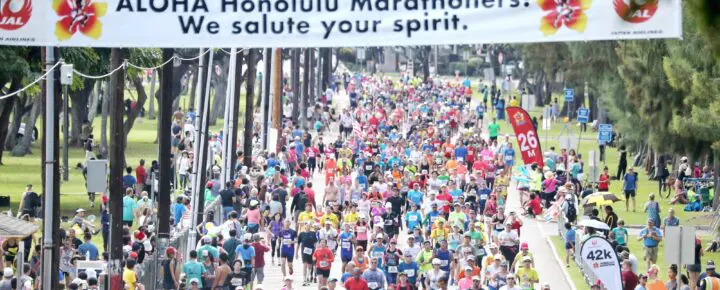
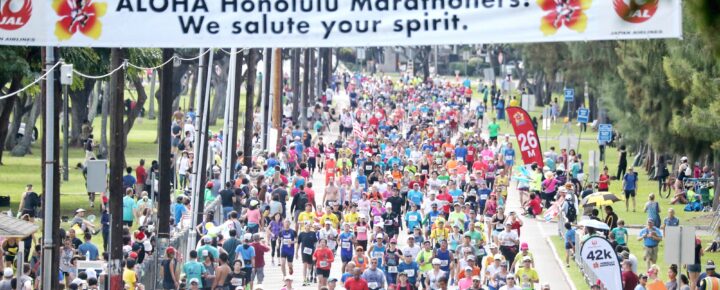
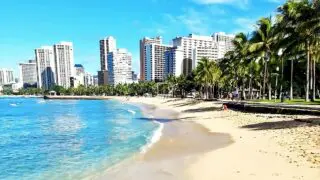
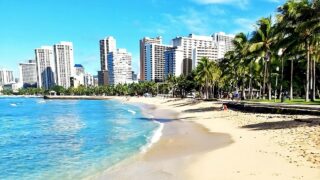


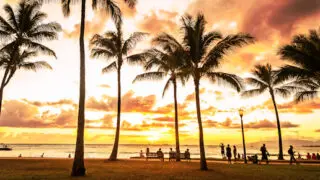
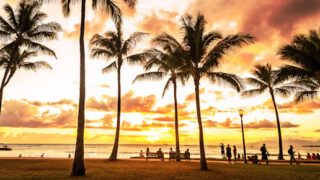
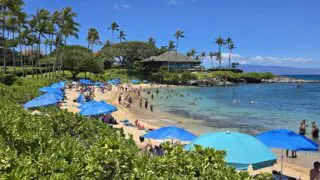
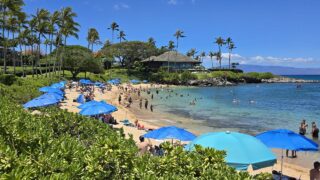

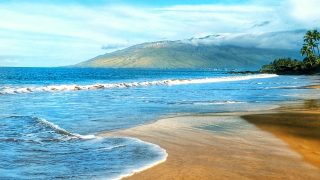
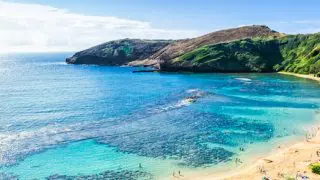
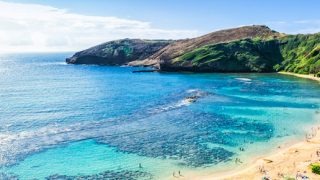
Has Hawaii ever considered a larger petting zoo? I’m wondering if anyone in the far flung volcanic rock of Hawaii has heard of just about every major city on the mainland. Most common among many, sports teams and players. Even more common, the crimes that seem to erupt daily. Hawaii already has too much, why bring more? Everything that I am hearing connected to saving Hawaii stops short of being nicer to mainland tourists. Lower the prices of rooms, get rid of the new fees, taxes, etc. While you’re at it, dump the HTA!
Hi
Just returned from a very pleasant/relaxing 2 weeks on Maui; yearly visitsfor 22 years, excepting COVID year. Despite bad publicity, almost everyone was pleasant (excepting 1 waitress at Cafe au Lei). Often have gone spring & fall; this trip Maui was the least crowded I have ever seen it-lots of parking, empty restaurants and hotels. Virtually every visitor we met was from the western US; rarely from western Canada (terrible exchange rate lately!) and even more rare Chinese; no Japanese. Wonder how much all the negative publicity contributes vs very steep prices for air, hotels and food.
Why not try to recover more western US tourism numbers? Probably a low bar compared to trying to entice less interested Japanese visitors or developing totally new sports markets – except Ironman and the odd golf tournament.
Despite interest in the Las Vegas sports draw experience, HI isn’t competitive with LV-dramatically more pricey air/hotels/food and a much bigger time commitment.
My wife and I were staying at the Outrigger Waikiki for a week with a Sunday morning departure. Unbeknownst to us the Honolulu Marathon was running that morning too. The hotel manager posted a notice in the elevator telling us that we will not be able to get our rental cars out in time for our flight. They recommended we move to a hotel near the airport if we couldn’t change our plans. It would have been nice if they told us at check in so we could have decided to add another day or leave early. That experience was the last time we’ll be staying at the Outrigger.
Hawaii can barely manage it’s own internal sporting events like surfing and canoe races. This past year, it was a 2-hour traffic jam just to get into Ke’ehi Lagoon Beach Park for the HCRA state championships. We had paddlers landing at the airport who were forced to walk, because the traffic was so bad. And this is for an event that is really only of interest to us locals.
Nā Wāhine o Ke Kai and Molokaʻi Hoe are the premier paddling events, and the facilities at Hilton Hawaiian Village leave visitors perplexed and sometimes in the way. The facilities on Molokaʻi at Hale o Lono work only because the people of Molokaʻi move heaven and earth to make it happen due to the cultural significance.
I canʻt see major league events being welcomed when infrastructure can barely handle local events.
IMO if Hawaii wishes to welcome Japanese tourist’s then select a Japanese Sport. Sumo Wrestling etc. If not welcoming Mainlanders to the islands then steer away from events that are on USA tour circuits or events. If US mainland tourists are not welcome then IMO no sport will make enough revenue to stay alive. All I can say is keep wishing Hawaii.
IMO it will never work. Surf competitions limited tourists. Superstars competition in the 70’s no longer. NFL pro bowl no longer at Aloha Stadium. With all the residents that get free admission to every island event then how does any sport make it worth it or profitable. Sorry too expensive for tourists to travel to Hawaii just to attend a sporting event. Traffic to the airport would be a nightmare and booking a departing flight would be impossible. At least in Las Vegas they already have the population and people at least have the option to drive to the event. The only big event on the big island that I know is the Triathalon event. Sorry Hawaii can’t even get pro golf to be on a pro tour at Turtle Beach Resort. .
Govenor Green sounds like he likes to travel on taxpayers’ money and is always looking for another solution vs confronting the main issues he has helped cause.
Why not just be nicer to tourists in general?
Lower the cost of hotels, rental cars etc. because that is the main reason I see for people not coming to the islands. I have no idea what travel interruptions he is talking about, that was 2020 not 2024!
Stop with the excuses!
Here’s an idea. Get the NFL to hold the draft in Honolulu. A 5 day event that does not require having a sports team. The 2025 draft is being held in Green Bay. Population about 100,000. People are booking rooms 60 miles away as the greater Green Bay area doesn’t have enough rooms. There are many ways you could entertain the visitors and still make millions of dollars for the local, and probably island wide, businesses.
Once again your elected politians are Way off the mark. Vegas is completely different and even they miss the mark at times. The formula racing was a disaster, hotels had to drastically drop pricing, fans didn’t have a great experience and the cabbies absolutely hated it. No the possibility of bringing the Oakland A’s but it will cost at least 380 Million dollar investment shouldered by the taxpayers if it even passes. Once again the tax payers are being asked to give free loading billionaires Free money for their benefit. Where is Hawaii going to get this money. If I know of a sporting event in town I avoid that area like the plague. You supposedly won’t have any Air bnb’s and no short term rentals, plus hotels will totally gauge the people staying for the event, most likely doubling the already absurd rates. Don’t even think about the traffic issues. it will make gridlock look like a walk in the park. Airfare for that short period of time will skyrocket. Am I missing anything?
Is understood that J green likes only Japanese tourists and likes to cut tourism all together by shutting down vacation rentals .
Yeah, that will work. Ironman already had to split the events on the Big Island because having the combined men’s and women’s events was too much for the local infrastructure and people. So we’re going to concentrate on that strategy when we can’t make work what we already had???
Here’s the deal. I cannot wrap my head around the resistance to gambling here. I mean, everyone gets on a flight from here and heads to 9th island, bringing all their money with them. I know it’s not just gambling, but visiting Ohana – but why not capture some of those dollars? Game rooms and crime already exist, so that can’t be the argument against it. If any, soft-start like online poker, online sports betting, etc. Setup a operator permit, create tax revenue. Problem solved. This fallacy of being a no gambling society is laughable.
As someone who lives in a 6-sport town, Seattle-Tacoma area, I think the Governor is in Las Vegas looking at more than just bringing professional sport events to the state. As a 10 year Seahawk Season ticket holder and currently a Mariners 20 game Season Ticket holder, I can tell you it’s expensive if you don’t have the means. Getting playoff tickets is nearly impossible if you are not a Season ticket holder. Seattle is one of the host cities for 2026 FIFA World Cup. If your a Sounders Season Ticket holder you’ll be the 1st to buy tickets. If not, good luck. Even if you have the means to buy single game tickets, good luck; tickets go quick. Seahawk single game tickets sell out within 10 mins. No joke. Gambling? Draft Kings & Fan Dual are big here but only after the State legalized it. The Pro Bowl was played forever at Aloha Stadium and the NFL pulled out. If you couldn’t keep the NFL how are you going to attract other sporting events?
A couple of thoughts.
– This is not the first time an ambitious politician in Hawaii has tried to figure out sports tourism for Hawaii. Mufi Hannemann, the former Mayor of Honolulu and part of DBEDT back in the early 90’s was all about sports tourism. Nothing came from it. Perhaps the Governor should ask Mufi why it never came to pass that Hawaii boosted its sports tourism.
– If the idea is to be everything to everyone and bring in all kinds of sports, that is not how many places do it. Take for instance Monaco and the Monico Grand Prix….they don’t also do a lot of football or other sports. It has one sport and it promotes the heck out of it to bring in the big money every year. Perhaps instead of doing an array of sports, we should start with one sport and get our name out there for that. We already have that with the IronMan and HNL Marathon.
Just when you think the local government can’t get any more ridiculous. Many sports require large venues. Building large stadiums with thousands of parking spaces means thousands of tourists and athletes, but I am sure they will all be “mindful visitors” who won’t harm the environment they say they are trying to protect. Not to mention, it takes a lot of money to build those venues. If they have that kind of money, why are they not using it to build affordable housing? I have to say…you all really know how to pick your state officials.
Whatever scheme they come up with, it will be used to justify a large project to host it – like aloha stadium or the convention center or the rail that never ends (construction).
Its the “if we don’t build it, they won’t come” shell game – politicians never get tired of handing out jobs to their friends.
Excellent point regarding mindful and respectful visitors, they are going to attract the exact tourists that they claim to not want on the islands.
In Nevada for sports “tourism”? I doubt it. The governor is there to learn about sports gambling. Sports betting is what brings in the big dollars and the casino support.
Anyone who’s been to Nevada knows this. Draft Kings just opened their new headquarters in Las Vegas-Summerlin. Huge building, you can even walk in and place bets. Across the street from Draft Kings is the new Durango Casino — and the Durango is all-in on sports gambling with their own network, STN Sports, and gambling kiosks and 24-hour sports gambling bar (it’s huge).
And then there is Allegiant Stadium, the Raiders new home. Yes, massive betting and gambling lounge at Allegiant, run by MGM Resorts, an “Official Gaming Partner” of the Raiders.
The sports gambling is open, notorious, and everywhere in Nevada. This is what you will see, learn, and understand drives sports “tourism” success.
Has the governor considered that in general, sports tourists may be more ‘unruly’ and more alcohol is prevalent? Is that what the local are comfortable with?
I’m really curious what other options are on the dart board that Green and the others in Hawaii that are related to tourism will hit with the next dart that they throw because so far literally Everything that they have tried so far has completely missed the mark! Maybe DEI tourism will be their next attempt at attracting people to Hawaii because that has worked out so well that countless companies are ditching that spew so maybe Hawaii will be the next to try and fail at it!
I thought Gov. Green wanted less tourists, not more? Or does he believe that sports tourism will bring in only those who can afford a high dollar sports vacation? And… what major sport is primary located in Hawaii? Surfing? That’s not really a high dollar sporting event.
Two major infrastructures that need to happen, new stadium, rail system that works. A rail system that can transport tourists from Waikiki would definitely be a major benefit. Yes, definitely attract the higher economic crowd.
What is “sports tourism” exactly?
I think it falls into 2 categories: participatory sports like the Honolulu Marathon and Iron Man Triathalon, and spectator sports. This article makes little distinction, especially in its comparison between Hawaii and Nevada.
In the case of participatory sports only major, disruptive events like the Honolulu Marathon, generate significant tourist traffic. I can’t see how the islands have the expertise or wherewithal to generate more events like this. When it comes to Spectators Sports I think the death of Aloha Stadium and the Pro Bowl show that’s not working very well either. Let’s face it, Nevada’s big tourism draw on participatory Sports is gambling. We’re not going to have that in Hawaii. So while this article was interesting as a weak justification for Governor Green’s boondoggle to Nevada it didn’t show any ways that Sports tourism could be developed in our state, if we even want to do that. So another non-starter.
While sports tourism could bring in revenue, Hawaii doesn’t need to copy everything Las Vegas does. Increasing tourism may not be the answer if it comes at the cost of sustainability or affordability.
A key issue is that Hawaii is already expensive for most visitors. If big events are brought in, regular tourists might be priced out even more, leaving the islands as a destination only for those who can afford higher costs, incuding sports tourists.
That’s what HTA, CNHA have said they want – less tourism.
I’m doubtful about whether sporting events will bring in enough revenue to offset Hawaii’s high operational costs. While Las Vegas thrives on volume, I’m, concerned that this model might not work for Hawaii.
Comparing Hawaii to Las Vegas isn’t fair because the cost of hosting and attending events in Vegas is way cheaper. In Hawaii, visitors face higher travel costs, hotel rates, and overall expenses, raising doubts about how Hawaii can compete at all.
While sports tourism sounds exciting, the concern is whether Hawaii can handle the increased traffic without compromising what makes the islands special. The worry is that more visitors might overcrowd the beaches and roads even more than they are already.
Do we really need more tourists in Hawaii? With all the pressure on our infrastructure and resources, adding more visitors—especially for big sporting events—could make things worse, not better.
Sports tourism is not what I as a tourist would want and not sure the Hawaiian people and spirit wants as an answer. More over crowding and cars shoved into a poor infrastructure. More tourist means more high rises, which doesn’t help the housing market or cost of living. If the governor wants Vegas, move to Vegas. Sometimes simple is better.
The 9 th island has something the other islands do not, a plentiful supply of cheap to moderately priced hotel rooms. This allows Las Vegas to attract a broad range of events appealing to a wider socio-economic cross section of fans and participants. Given the higher transportation cost to get to the first eight islands, participation might be limited if the high lodging costs are not addressed.
It costs, on average, $125 a night to stay in Nevada for sporting events or when kids are doing traveling sports, plus there is a plethora of places to choose from. Sports are expensive and Nevada should not be a comparable to Hawaii. In traveling sports teams (just for youth) you average $5k-$10k per season just traveling on the mainland. Having to fly to Hawaii from the mainland and then pay to stay at way higher rates? – Green is wasting his time and should be focused on creating from within instead of bringing in more tourism to fill his pocket.